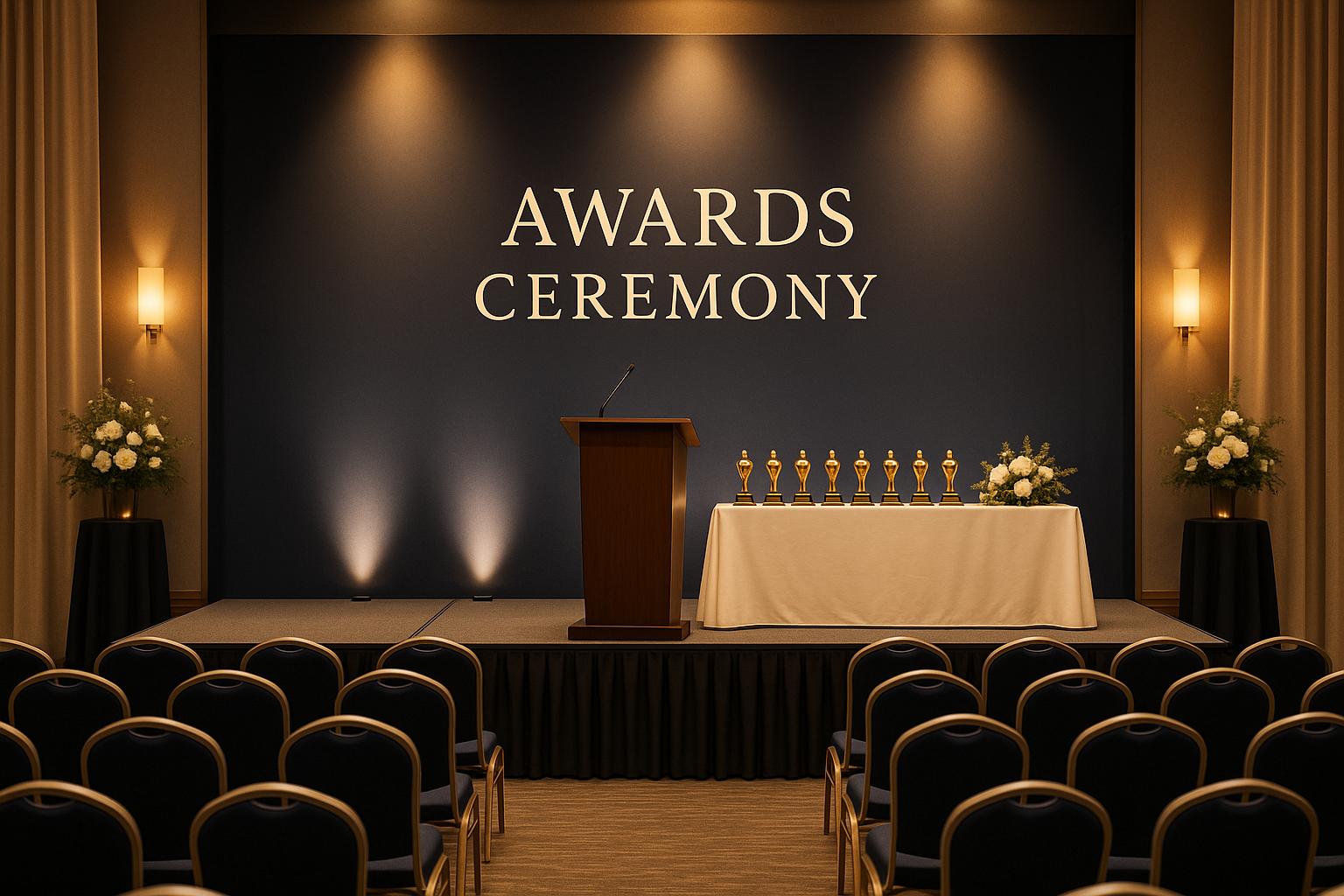Guide to Planning A Corporate Awards Ceremony With A Professional Production Team

Chief Executive Officer

Corporate awards ceremonies are more than just handing out trophies - they’re about celebrating achievements, boosting team morale, and showcasing company values. But even the best-planned events can fall flat without professional production. From clear sound and dramatic lighting to a well-designed stage, these technical elements ensure a polished experience that impresses both attendees and key stakeholders.
Here’s how to plan a successful awards ceremony:
- Set Clear Goals: Align the event with company priorities, like improving employee morale or reinforcing brand identity. Use measurable outcomes (e.g., survey scores, social media engagement) to track success.
- Budget Wisely: Allocate resources effectively. Production (35–45%) and venue (20–30%) are typically the largest expenses. A well-planned $30,000 event can outperform a poorly executed $75,000 one.
- Create a Timeline: Start planning at least four months in advance. Book venues and production teams early, finalize award recipients, and schedule rehearsals to avoid last-minute issues.
- Hire a Skilled Production Team: Choose a partner experienced in corporate events. Look for detailed estimates, reliable equipment, and a dedicated project manager to simplify coordination.
- Plan for Execution: Focus on audiovisual design, stage setup, and lighting to create a professional atmosphere. Rehearse thoroughly and have backup systems ready for potential technical issues.
- Gather Feedback: Post-event surveys and stakeholder interviews help measure success and identify areas for improvement.
Partnering with experts ensures your event runs smoothly, allowing you to focus on celebrating your team’s accomplishments.
Setup For Awards Show - Event production for private and corporate , road shows and conferences.
Setting Event Goals, Budget, and Timeline
Planning a successful awards ceremony requires more than just good intentions. You need clear objectives, a realistic budget, and a well-structured timeline. These elements work together to ensure your event delivers meaningful outcomes, stays within financial boundaries, and meets deadlines.
Setting Clear Event Goals
Your event goals should go beyond simply handing out awards. The best goals align with your organization's priorities and lead to measurable results that justify the event's cost.
Start by identifying your organization's needs. Are you addressing employee retention issues, tackling low engagement, or reinforcing company values? These answers will shape your strategy.
Boosting employee morale is a common goal for corporate awards ceremonies. For example, you might showcase achievements from all departments to ensure everyone feels included, or focus on teams that faced unique challenges. The goal is to make every attendee feel appreciated, not just those receiving awards.
Another objective could be strengthening your brand identity, especially if your company is growing or undergoing changes. Your awards ceremony can reflect your core values through the categories of awards, the speeches, and even the event's visuals. For example, if innovation is a key value, you could create awards that celebrate creative problem-solving and forward-thinking projects.
Set measurable targets to evaluate success. These might include employee satisfaction scores from post-event surveys, social media engagement, or retention rates among recognized employees in the months after the event. Having these metrics in place not only justifies the investment but also provides clarity throughout the planning process.
Once your goals are clear, it’s time to allocate your budget effectively.
Budget Planning for Corporate Awards Ceremonies
The cost of a corporate awards ceremony can vary widely, ranging from $15,000 to over $150,000. The key is to focus on how you allocate your resources. A thoughtfully planned $30,000 event can have a bigger impact than a poorly executed $75,000 one.
Here’s a general breakdown of where your budget might go:
- Production: 35-45%
- Venue: 20-30%
- Awards: 10-15%
- Catering: 15-25%
- Contingencies: 10-15%
Production costs are typically the largest expense, but they’re also the most critical for creating a memorable experience. Cutting corners here can lead to technical glitches that overshadow the entire event.
Venue expenses can vary a lot depending on location and timing. Spaces in major cities are more expensive, especially during peak seasons like September to November or March to May. If possible, consider hosting your event during slower periods to save on costs.
When it comes to awards and recognition gifts, personalization and premium materials can quickly drive up costs. Focus your budget on high-quality awards for top categories, while using more economical options for broader recognition.
Catering costs depend on the type of service you choose - whether it’s a formal dinner, a cocktail reception, or light refreshments. Keep in mind that many venues have food and beverage minimums, which can impact your budget, particularly for smaller events.
With your budget set, the next step is creating a detailed timeline to keep everything on track.
Building a Planning Timeline
A well-organized timeline is essential for ensuring your event runs smoothly. Once your goals and budget are established, aim for a four-month planning period. For more complex events or those scheduled during busy seasons, six months or more may be necessary.
Here’s an example of a planning timeline for a July ceremony:
- Venue and production team booking: Secure these by March 15, 2026. Popular venues and experienced production teams get booked quickly, especially during peak seasons.
- Award nomination and selection: Begin by April 1, 2026, and confirm recipients by May 15, 2026. This allows plenty of time for speech preparation and any special recognition elements.
- Production planning: Start early and schedule your initial meeting by May 1, 2026. Use this time to discuss staging, technical needs, and audiovisual requirements. Follow up with meetings on June 1 and June 15 to finalize details.
- Rehearsals: Plan a technical rehearsal five days before the event and a full dress rehearsal the day before. This ensures presenters and award recipients are comfortable with the setup.
- Final confirmations: Touch base with all vendors 72 hours before the event. Confirm catering headcounts, equipment delivery schedules, and the event timeline with the venue staff.
On the day of the event, setup usually begins 4-6 hours before guests arrive. For an evening ceremony, plan to start setup by 1:00 PM if guests are arriving at 6:00 PM.
Working with a Professional Production Team
Once you’ve set your timeline, the next step is finding a production partner. The right team brings the technical know-how in audiovisuals, staging, and event logistics to make your awards ceremony unforgettable. This partnership sets the stage for defining key roles and establishing smooth coordination practices with your production team.
How to Choose the Right Production Partner
Selecting a production partner with experience in corporate awards ceremonies is critical. They’ll already be familiar with important protocols, like the sequence of award presentations and winner announcements.
Review their portfolio to ensure they’ve handled events similar in size and scope to yours. Pay close attention to their technical capabilities and whether they have reliable backup systems in place. It’s a good idea to ask about their equipment inventory, backup plans, and crew size. A professional team should own most of their core equipment rather than relying entirely on rentals, which can minimize the risk of technical hiccups at the last minute.
Evaluate their project management approach. Look for a structured communication system and confirm that they assign a dedicated project manager. This person will be your single point of contact, saving you from the hassle of coordinating with multiple team members.
If your company operates in multiple locations, consider the production company’s geographic reach. Some companies have networks that can manage events across different cities while maintaining consistent quality. This can be especially useful if you’re planning regional ceremonies or if key stakeholders will be traveling to attend.
Finally, ensure financial transparency. Reputable production companies provide detailed, line-item estimates that clearly outline costs for equipment, labor, and services. Be cautious of companies offering only lump-sum quotes without explaining what’s included.
Key Production Team Roles
To ensure a smooth working relationship, it’s helpful to understand the roles within a production team. Each member plays a specific part in making your event a success.
- Technical Director: This person oversees all technical aspects of your event. They coordinate between departments, decide on equipment placement, and act as the main link between your planning team and the production crew. During the event, they manage the technical timeline and handle any issues that arise.
- Audiovisual Engineers and Video Specialists: These experts manage sound systems, video displays, recordings, and live streaming. From ensuring speeches are clearly heard to playing award recipient videos glitch-free, they’re essential. They also test all systems several hours before the event to avoid surprises.
- Stage Manager: The stage manager ensures the smooth flow of people on and off the stage. They work closely with presenters and award recipients, coordinate transitions, and communicate with the technical director about lighting and sound cues. This role is especially crucial for larger ceremonies with multiple awards.
- Lighting Designers: These professionals create the visual atmosphere for your event. From strategically placing lights to designing schemes that highlight speakers and set the right mood, they go beyond basic illumination to enhance the overall experience. Their work also ensures high-quality photography and videography.
Coordination Best Practices
With roles clearly defined, the focus shifts to effective coordination. Successful events rely on structured communication and clear expectations from the start of your partnership with the production team.
Establish clear communication protocols and document all decisions in writing. Schedule regular milestone meetings to keep everyone aligned. Many production companies use project management tools that provide real-time updates on planning progress and task completion.
Be specific about your event requirements. For example, instead of saying you need “good sound,” specify that you’ll need wireless microphones for six presenters, audience microphones for Q&A sessions, and background music for pre-ceremony networking. The more detailed you are, the easier it will be for the production team to plan and provide accurate pricing.
Plan regular meetings at key intervals, such as 60 days, 30 days, and one week before the event. These check-ins give you time to address concerns and make adjustments without rushing or compromising quality.
Involve key stakeholders in planning meetings when their input impacts technical needs. For instance, if your CEO has specific preferences for their presentation or if award recipients will participate virtually, include them in discussions. This helps avoid last-minute changes that could disrupt preparations.
After each meeting, send a summary email outlining what was discussed, decisions made, and next steps. This ensures everyone is on the same page and helps prevent anything from slipping through the cracks as the event date approaches.
Finally, plan for contingencies. Discuss potential issues like no-shows, equipment failures, or venue changes in advance. This allows the production team to prepare backup equipment and alternative procedures, ensuring your event runs smoothly no matter what.
sbb-itb-ae35a94
Planning the Event Experience
With your production team ready, it's time to craft an event experience where every detail works together to leave a lasting impression. Below, we’ll explore how to bring audiovisual elements, stage design, lighting, and sound into harmony for your awards ceremony.
Audiovisual Design Planning
Create a focused audiovisual plan to ensure your content is both clear and captivating. Work closely with your production team to deliver visuals that not only look professional but also guide the audience through the ceremony effortlessly.
Stage Design and Setup
Your stage should be a perfect blend of style and practicality. Aim for a design that provides clear sightlines for all attendees while showcasing your brand's personality. A well-thought-out stage layout ensures the ceremony runs smoothly and keeps the audience engaged.
Lighting and Sound Planning
Lighting can do wonders for setting the ambiance and directing attention to key moments. Pair that with sound that’s crisp and well-coordinated, ensuring smooth transitions between segments and keeping every word and note crystal clear for your audience. Together, they elevate the overall experience.
Running and Reviewing the Event
The final stretch of your corporate awards ceremony is where everything comes together. It’s also your chance to gather insights that can make your future events even better.
Rehearsals and Backup Planning
Once your timeline is set, it’s time to focus on rehearsals and backup systems. Schedule a full technical rehearsal 24–48 hours before the event. This is your opportunity to test microphones, video content, and lighting cues. Giving your production team this window ensures any technical hiccups can be resolved well before showtime.
Prepare for the unexpected by setting up backup systems. Have spare microphones ready, store duplicate video files on separate devices, and ensure your lighting setup includes a manual override option. Develop a “show must go on” plan that outlines how to handle major disruptions, like a screen failure or sound issue during a key moment.
Communication is critical. Work with your production partner to establish clear channels for the event. Assign specific team members to handle different types of issues - someone for audio, another for lighting, and a point person for venue coordination. This division of responsibilities ensures quick responses to any problems.
If your event includes live streaming or real-time social media integration, test your internet redundancy. While most venues provide backup internet options, having a mobile hotspot as an extra safeguard can save the day.
Live Event Management
With rehearsals complete and backup systems in place, it’s time to focus on delivering a seamless live experience. Equip your production team with detailed cue sheets that map out every transition, lighting adjustment, and audio change. These serve as a step-by-step guide, keeping the technical crew aligned throughout the event.
Appoint a lead coordinator who has the authority to make on-the-spot decisions. This person can address unexpected challenges quickly, ensuring the event stays on track. Keep an eye on audience engagement during the ceremony - adjust elements like lighting or sound levels to maintain energy if the room starts to lose focus.
Position a troubleshooting team at key spots around the venue. These team members should be in constant communication with the production booth and ready to handle issues like microphone feedback or projector glitches without drawing attention away from the ceremony.
Document any issues that arise during the event. These notes will be invaluable during your post-event review.
Post-Event Review and Feedback
Within 24–48 hours after the event, send out a short survey to attendees. Keep it brief - around 5–10 minutes - to encourage participation while their experience is still fresh. Include both rating-scale questions and open-ended prompts to gather a mix of quantitative and qualitative feedback.
Focus on metrics that align with your goals. For corporate awards ceremonies, common success indicators include attendance, revenue generated, and audience engagement. According to recent data, 67% of event organizers prioritize attendance as their main metric for in-person events, with 56% focusing on revenue and 54% measuring engagement.
Tools like Corporate Optics’ analytics platform can help you dive deeper into these metrics. Their dashboards provide a clear view of social media activity, attendee movement within the venue, and other valuable data. This helps pinpoint which parts of your event hit the mark and where there’s room to improve.
In addition to surveys, conduct interviews with key stakeholders to uncover insights that might not surface in general feedback. Look at how the event impacted employee morale and reinforced company values.
Review any technical issues logged during the event to evaluate the effectiveness of your contingency plans. Pair this with attendee feedback to assess your production team’s performance and identify areas for improvement.
Finally, compare your event’s results to past ceremonies and industry benchmarks. Look for trends in feedback, technical execution, and return on investment. Use this analysis to refine your approach for future events. A detailed post-event report that combines hard data with attendee insights can strengthen your collaboration with your production team and pave the way for even better events down the line.
Conclusion
Pulling off a successful corporate awards ceremony takes more than just picking a venue and checking off a to-do list. What truly sets a memorable event apart is professional production expertise. A skilled production partner can take your ideas and transform them into a seamless, engaging experience through careful planning and flawless execution.
Start by laying a strong foundation: define clear objectives, create a realistic budget, and map out a detailed timeline. These steps provide the structure needed to keep everything on track while allowing room to adapt to unexpected challenges.
Choosing a production partner with a proven track record in corporate events is crucial. They bring clarity to communication, ensure everyone knows their role, and coordinate every detail to keep the event running smoothly.
From audiovisual design and stage setup to lighting and sound, every element should work together to create an immersive experience. A professional team knows how to balance these components to make your honorees feel celebrated and keep your audience engaged from start to finish.
Rehearsals, backup systems, and post-event evaluations are the final touches that ensure professionalism and provide valuable insights for future events.
Corporate Optics excels at weaving all these elements into a cohesive event. Their end-to-end planning services cover everything from brainstorming the initial concept to analyzing post-event feedback. With an Emmy Award-winning production team, they deliver top-tier technical execution, including custom stage design, audiovisual production, live streaming, and speaker support. They handle the intricate details, leaving you free to focus on celebrating your team's accomplishments.
Armed with these strategies and a reliable production partner, your next corporate awards ceremony can be stress-free and unforgettable, honoring your recipients while reinforcing your company’s core values.
FAQs
What should I focus on when setting goals for a corporate awards ceremony to ensure it reflects company values and objectives?
When planning a corporate awards ceremony, the first step is to clearly define its main purpose. Think about how the event can reflect your company’s core values and align with broader strategic goals. Whether it’s recognizing outstanding performance, lifting employee morale, or celebrating specific milestones, the purpose should guide every decision.
Select award categories that directly connect to your organization’s priorities. For example, you might spotlight achievements in areas like teamwork, leadership, or creative problem-solving. Beyond the awards themselves, aim to create an event that resonates with employees, encourages participation, and ties into larger business objectives. This ensures the ceremony is not just a celebration but also a meaningful experience for everyone involved.
How can I plan a budget for a corporate awards ceremony that delivers impact without overspending?
To organize a corporate awards ceremony that leaves a lasting impression without breaking the bank, start by pinpointing the essentials: audiovisual technology, stage design, lighting, and sound. These are the elements that most influence the overall experience, so they deserve careful attention. It’s also smart to set aside about 10% of your budget as a contingency fund for any unexpected costs.
Get quotes from several vendors to compare pricing and ensure you’re getting the best deal. Keep your spending aligned with the event’s main objectives, and look for opportunities to streamline the agenda to cut costs without compromising on quality. Stay on top of your expenses throughout the planning process, making adjustments as needed to stick to your budget while still delivering a smooth and memorable event.
What qualities should I look for in a production team to ensure my corporate awards ceremony is a success?
When planning a corporate awards ceremony, selecting the right production team can make all the difference. Look for a team with deep experience in corporate events and a proven track record of dependability. They should excel in communication, organization, and creative problem-solving, while also handling high-pressure situations effortlessly.
Make sure they have strong skills in audiovisual technology, stage design, lighting, and sound, and that they can tailor these elements to fit the vision and objectives of your event. Reviewing client testimonials and examples of their previous work can give you a clearer picture of their expertise and professionalism.
Related Blog Posts









